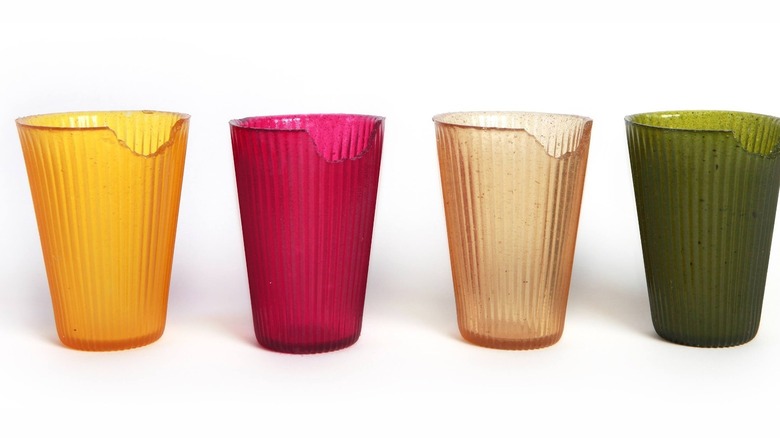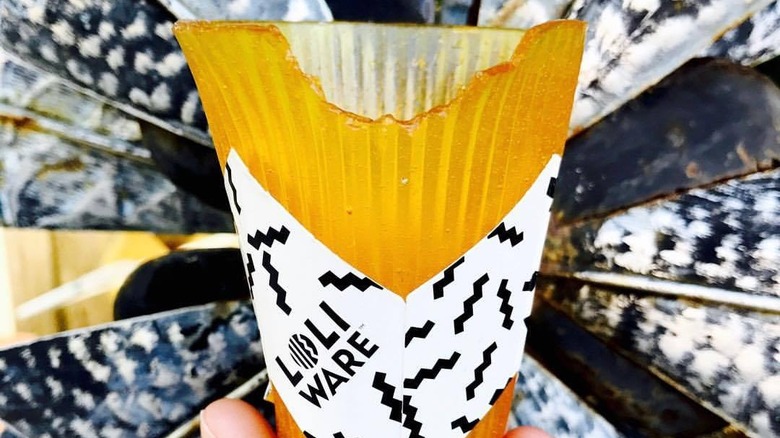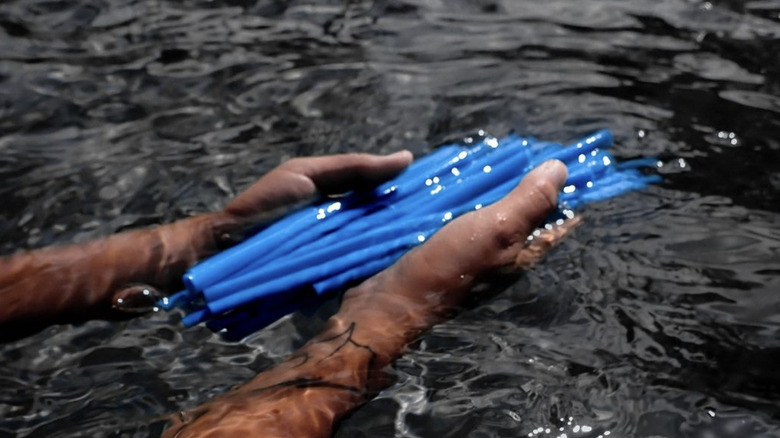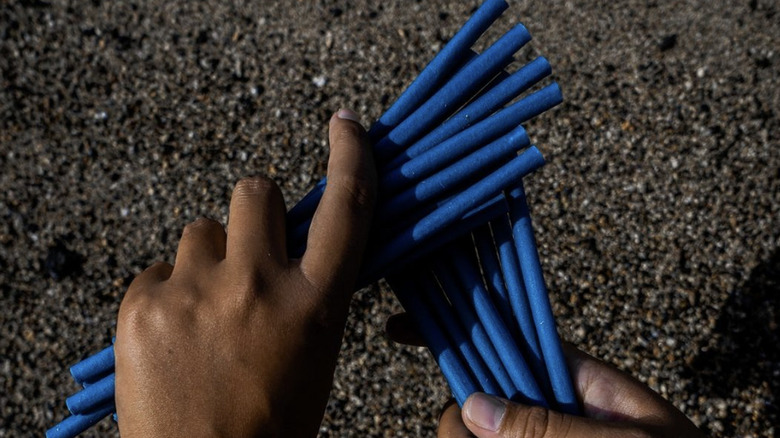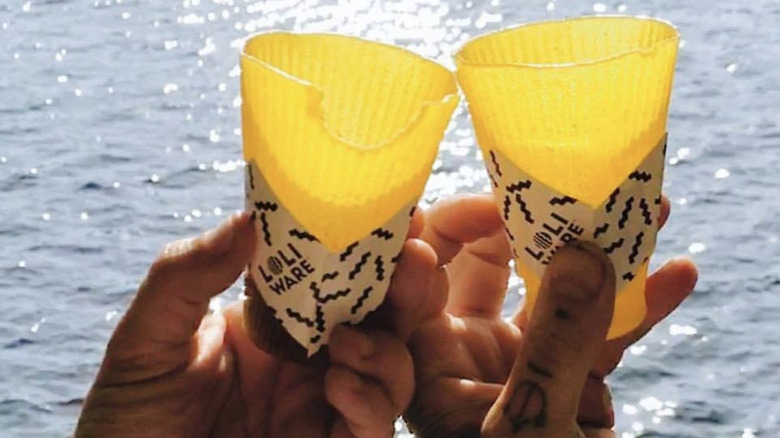Here's What Happened To Loliware After Shark Tank
We may receive a commission on purchases made from links.
With an estimated 8 million tons of plastic in the world's oceans as of 2010, it's safe to say that society has a bit of a plastic problem. Chelsea Briganti imagined a world without plastic and non-degradable products, taking to "Shark Tank" to showcase her product. You may have remembered her biodegradable cups, Loliware, if you watched Season 7, Episode 2 of the show. The cups were made from a combination of seaweed as well as sugar, meaning they were both biodegradable as well as edible.
Growing up in Hawaii, Briganti experienced firsthand the effect that plastic and other non-degradable products can have on the environment. She even has the nickname Sea, dropping the first half of her name. However, it wasn't until 2010 that Brigant partnered with Leigh Ann Tucker to develop their product. The duo realized that seaweed would allow them to develop a cup that could disappear. In an interview with CNBC, Briganti explained, "Sea technology is a competitive technology to replace plastic at scale because it's high performing, cost-competitive, scalable, and regenerative."
On the "Shark Tank" podcast, Tucker explained the early days of the company. She said, "Chelsea and I put in as much investment as we could of our own pockets just to develop the idea." The two soon began an investment round attempting to raise $1 million. That's when they turned their attention to "Shark Tank," hoping they wouldn't be a food company that flopped on the show.
What happened to Loliware on Shark Tank?
Appearing on "Shark Tank," Chelsea Briganti and Leigh Anne Tucker wanted to approach the sharks cautiously. The two asked for an investment of $150,000 for 10% of their company. As Briganti and Tucker explained on the "Shark Tank" blog, their reasoning for this was calculated based upon research of the show. They figured too high of an ask would spook the sharks.
However, it was soon open season in the tank as the investors sunk their teeth into a company they just couldn't pass up. Shark Mark Cuban initially partnered with Robert Herjavec before a last-minute betrayal saw him striking a deal with Barbara Corcoran instead. Meanwhile, Herjavec partnered with Kevin O'Leary, leaving Briganti and Tucker to decide between two dueling offers. The decision left the two feeling overwhelmed, but both Briganti and Tucker had Cuban and Corcoran as their initial picks for investors before even going on the show.
It ended up being a bit of a no-brainer for the duo with them agreeing to a deal of $600,000 for 25% equity, but was it one of the biggest deals in "Shark Tank?" However, as anyone who's been on the show knows, getting an investment on "Shark Tank" is just half of the battle.
Loliware after Shark Tank
In the initial aftermath of "Shark Tank," Loliware appeared to be on the road to success. As with other "Shark Tank" companies, Loliware found an extreme amount of interest in its product after the episode aired. As its founders told the "Shark Tank" blog, Loliware's products were back-ordered immediately after the show. The founders had plans to introduce smaller and larger-sized cups as well as partner with soda companies.
However, negative reception to the product caused Loliware to go back to the drawing board. Slow order times and broken products soured customers on the product. As one reviewer Amazon wrote, "The cups were melted when they got to me." With that in mind, Loliware went through a bit of a rebrand, pivoting away from edible cups to straws. During this period, the company focused on raising additional capital. While the company continued with Mark Cuban, it appears Barbara Corcoran did not move forward with her end of the deal.
In 2018, Loliware launched a successful campaign on Indiegogo for around $85,000. The following year it raised an additional $49,000 on Kickstarter. The brand's pivot found renewed interest, but the company also encountered problems along the way as well.
Is Loliware still in business?
Loliware is still in business today. However, the company has undergone a stark evolution from its initial "Shark Tank" roots. There were some hiccups with online backers complaining about long wait times and not receiving their biodegradable straws. But, the company didn't abandon the idea outright as it did edible cups. Lolistraw ended up becoming a prototype for Loliware's blue carbon straw brand, which the company has put a lot of focus on marketing-wise.
This period also marks a period of additional funding and a structural shift in Loliware's day-to-day. In total, the company has raised more than $12 million, finding investors with H/L Ventures as well as Sustainable Ocean Alliance among others. The company's straw appears to be just one of the products that it's working on. Overall, Chelsea Briganti has set her sights on Loliware becoming a manufacturer of a host of biodegradable products. In an interview with Closed Loop Partners, Briganti explained, "Seaweed is definitely part of the future of replacing plastic. All of our seaweed is sustainably sourced. Our supplier in Europe harvests it in accordance with strict regulations." With that in mind, what does the future hold?
What's next for Loliware
In recent years, Loliware has experienced some changes. For one, founder Leigh Ann Tucker opted to leave the company, but Chelsea Briganti has stayed on, overseeing a new focus. In early 2023, Loliware expanded on its bold vision for a plastic-less future by introducing seaweed resin during an international conference. In a press release, Briganti explained that the new material "unlocks hundreds, if not thousands, of new products to replace single-use plastics at scale using the industry's existing equipment."
Likewise, the company has continued to add to its ranks as well. Also in early 2023, Loliware added former Dow Senior Sustainability Leader Jeff Wooster to its scientific board. As the company sets itself up for bigger and bigger ambitions, who knows quite what the future holds for Loliware? Briganti has already entertained the idea of using artificial intelligence, writing on the company site, "I'm looking forward to meeting other packaging innovators who are also working with AI for new materials discovery and meeting new corporate partners interested in partnering with LOLIWARE to bring seaweed materials into the mainstream."
